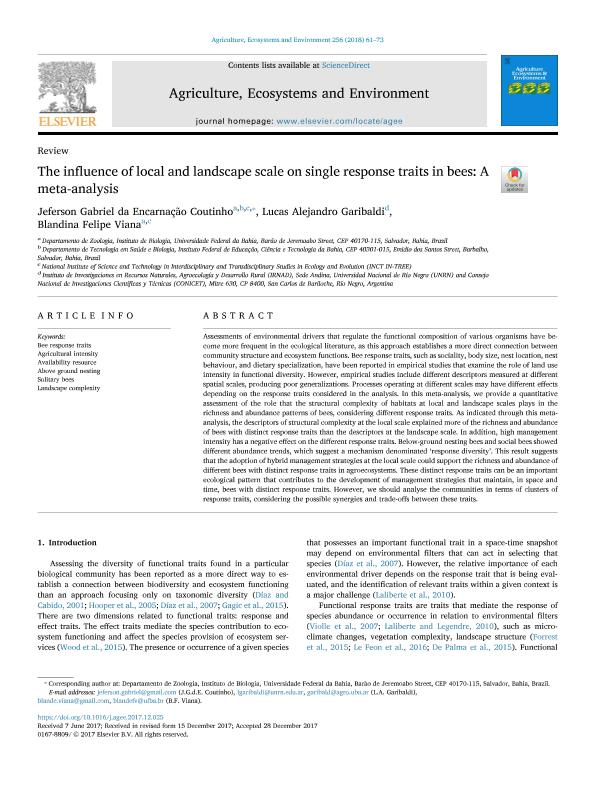Mostrar el registro sencillo del ítem
dc.contributor.author
Coutinho, Jeferson Gabriel da Encarnação
dc.contributor.author
Garibaldi, Lucas Alejandro

dc.contributor.author
Felipe Viana, Blandina

dc.date.available
2020-02-10T21:43:52Z
dc.date.issued
2018-03
dc.identifier.citation
Coutinho, Jeferson Gabriel da Encarnação; Garibaldi, Lucas Alejandro; Felipe Viana, Blandina; The influence of local and landscape scale on single response traits in bees: A meta-analysis; Elsevier Science; Agriculture, Ecosystems and Environment; 256; 3-2018; 61-73
dc.identifier.issn
0167-8809
dc.identifier.uri
http://hdl.handle.net/11336/97134
dc.description.abstract
Assessments of environmental drivers that regulate the functional composition of various organisms have become more frequent in the ecological literature, as this approach establishes a more direct connection between community structure and ecosystem functions. Bee response traits, such as sociality, body size, nest location, nest behaviour, and dietary specialization, have been reported in empirical studies that examine the role of land use intensity in functional diversity. However, empirical studies include different descriptors measured at different spatial scales, producing poor generalizations. Processes operating at different scales may have different effects depending on the response traits considered in the analysis. In this meta-analysis, we provide a quantitative assessment of the role that the structural complexity of habitats at local and landscape scales plays in the richness and abundance patterns of bees, considering different response traits. As indicated through this meta-analysis, the descriptors of structural complexity at the local scale explained more of the richness and abundance of bees with distinct response traits than the descriptors at the landscape scale. In addition, high management intensity has a negative effect on the different response traits. Below-ground nesting bees and social bees showed different abundance trends, which suggest a mechanism denominated ‘response diversity’. This result suggests that the adoption of hybrid management strategies at the local scale could support the richness and abundance of different bees with distinct response traits in agroecosystems. These distinct response traits can be an important ecological pattern that contributes to the development of management strategies that maintain, in space and time, bees with distinct response traits. However, we should analyse the communities in terms of clusters of response traits, considering the possible synergies and trade-offs between these traits.
dc.format
application/pdf
dc.language.iso
eng
dc.publisher
Elsevier Science

dc.rights
info:eu-repo/semantics/openAccess
dc.rights.uri
https://creativecommons.org/licenses/by-nc-nd/2.5/ar/
dc.subject
ABOVE GROUND NESTING
dc.subject
AGRICULTURAL INTENSITY
dc.subject
AVAILABILITY RESOURCE
dc.subject
BEE RESPONSE TRAITS
dc.subject
LANDSCAPE COMPLEXITY
dc.subject
SOLITARY BEES
dc.subject.classification
Ecología

dc.subject.classification
Ciencias Biológicas

dc.subject.classification
CIENCIAS NATURALES Y EXACTAS

dc.subject.classification
Agricultura

dc.subject.classification
Agricultura, Silvicultura y Pesca

dc.subject.classification
CIENCIAS AGRÍCOLAS

dc.title
The influence of local and landscape scale on single response traits in bees: A meta-analysis
dc.type
info:eu-repo/semantics/article
dc.type
info:ar-repo/semantics/artículo
dc.type
info:eu-repo/semantics/publishedVersion
dc.date.updated
2019-10-15T17:30:30Z
dc.journal.volume
256
dc.journal.pagination
61-73
dc.journal.pais
Países Bajos

dc.journal.ciudad
Amsterdam
dc.description.fil
Fil: Coutinho, Jeferson Gabriel da Encarnação. Universidade Federal da Bahia; Brasil
dc.description.fil
Fil: Garibaldi, Lucas Alejandro. Consejo Nacional de Investigaciones Científicas y Técnicas; Argentina. Instituto de Investigaciones en Recursos Naturales, Agroecología y Desarrollo Rural; Argentina
dc.description.fil
Fil: Felipe Viana, Blandina. Universidade Federal da Bahia; Brasil
dc.journal.title
Agriculture, Ecosystems and Environment

dc.relation.alternativeid
info:eu-repo/semantics/altIdentifier/url/https://www.sciencedirect.com/science/article/pii/S0167880917305613
dc.relation.alternativeid
info:eu-repo/semantics/altIdentifier/doi/http://dx.doi.org/10.1016/j.agee.2017.12.025
Archivos asociados
